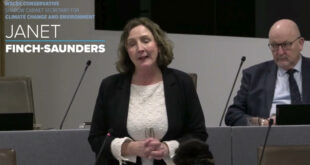When you push on the door firmly enough, it eventually caves in.
The private equity consortium stalking investor platform Hargreaves Lansdown has come up with a bid price of £5.4billion, or £11.40 a share, which the board, headed by new chairman Alison Platt, is minded to accept.
Why should we expect anything different? A year ago, she disposed of leading edge UK veterinary pharma group Dechra to Swedish finance group EQT.
The biggest shareholder and co-founder Peter Hargreaves sounds delighted.
He does not spare the blushes of the previous chairman Deanna Oppenheimer or chief executive Chris Hill, who he describes as ‘equally useless’.
Takeover: The private equity consortium stalking Hargreaves Lansdown has come up with a bid of £5.4bn, which the board, headed by new chairman Alison Platt, is minded to accept
As alluring as the share price premium of 55 per cent may appear investors should consider the context.
Platt and chief executive Dan Olley are silent on the broader stakeholder interest or the strategy of would-be owners which include CVC, Nordic Capital and Platinum Ivy – Abu Dhabi in disguise.
The price may look generous. But like much of the UK’s financial sector, HL shares have been in the doldrums and a rerating of London might see the stock regain its mojo.
Personally, I along with many other HL clients, have never forgiven it for exposing us so heavily to Neil Woodford’s busted investment funds.
Nevertheless, HL is a pioneer in furthering the Thatcherite dream of a shareholding democracy.
It provided an important direct bridge to direct equity investment and funds for savers at a time when the banks, with the exception of Barclays, moved away from stockbroking.
There is no reason why it should not continue independently rather than allowing a debt-free balance sheet to be loaded up with funny money.
If a deal was needed then far better to for HL to have aligned itself with one of the big UK financial players rather than bow to a consortium without a strategy.
Royal Mail alert
Don’t let anyone say that ownership does not matter. The travails of Thames Water under remote, mainly overseas shareholders, are well documented.
On a more parochial level, Asda’s departure from the safe ownership of US retail master Walmart into the hands of private equity backers TDR and entrepreneurs Mohsin and Zuber Issa has proved salutary.
Data from market research group Kantar shows Asda lost 4 per cent market share year-on-year, losing ground to Tesco and Sainsbury’s, as well Aldi and Lidl.
Critics of our campaign to stop the Czech sphinx Daniel Kretinsky from spending £3.6billion on buying International Distributions Services, owner of the Royal Mail, argue that it has been so poorly run that it would benefit from tough, private ownership.
That is naive, as private equity ownership of Asda and Morrisons shows.
Under the tutelage of former Tesco boss Terry Leahy, Bradford-based Morrisons is showing signs of coming back. The debt burden in both groups, in a period of high interest rates, has been an investment killer.
At Asda, the accumulated debt burden of the Issa brothers is among the factors which led to the departure of Zuber, and private equity group TDR bulking up its stake.
Royal Mail needs focused management, a rebooted relationship with the unions and investment, not an extra debt pile and proprietors with no cultural understanding of the UK.
Bailey nudge
Politics should play no part in tomorrow’s Bank of England interest rate decision. It should follow the lead of the European Central Bank and look through the July 4 election and cut its key interest rate from the current 5.25 per cent.
Inflation is in full retreat. Kantar’s latest data shows that annual food price inflation dropped to 2.1 per cent in the last month from 2.4 per cent.
Lower food and energy costs should be reflected in the latest official numbers expected today with some forecasters expecting the headline consumer prices index to slip below the 2 per cent target. Service sector costs are moderating.
Wages are running ahead of prices but all the evidence suggests a softening in the labour market. The trend of settlements is heading downwards. Our message to Andrew Bailey and the Bank: be bold.
Source link



